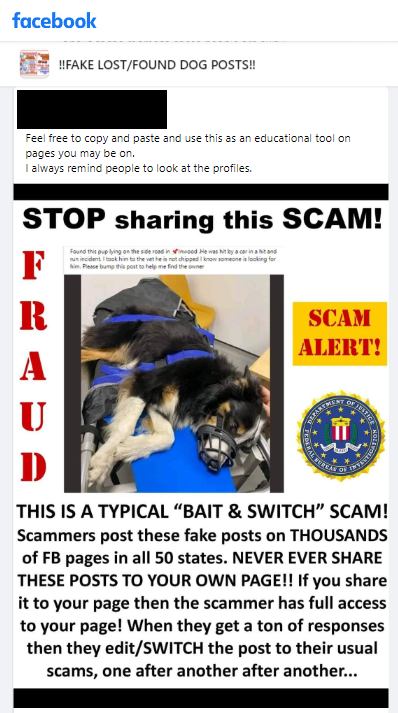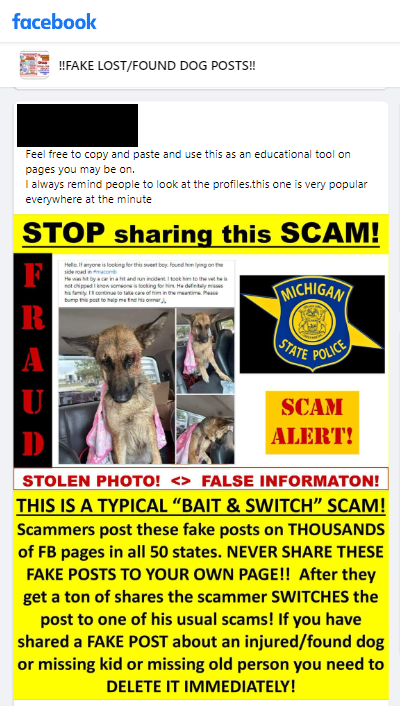Scam alert: Before you share injured dog post on social media, check the source
Scammers gonna scam.
But now they’re using photos that tug at your heartstrings to do the dirty deed.
A new trend that’s been going on for a while, but really popping up quite a bit on social media.
The scam starts when someone adds a photo of an injured animal. The post then says the dog or cat is injured and needs help finding the owner, and requests people share it.
It’s a good scam because who isn’t going to share a poor pet that desperately needs medical attention? You’d have to be a real jerk to not click share.
But, if you notice the person who shared the post has turned off comments, you might want to do a little investigation before clicking share. Because once enough people share this, the scammer edits the posts and puts something new in there.
Now the same post you shared about the dog needing help has been switched to selling sunglasses or promoting something else. And your friends think you’ve endorsed it.

Is it spam?
Is it a virus?
Who knows? But your friends will soon find out when they click on it.
It doesn’t mean you shouldn’t share lost pets, but before you click share, do a little research.
Shark week: Fishing: Jacks hit in Barnegat Bay as water temps hit 80
Click on the person’s profile. Did they just create the account? If so, that’s a red flag. Do they have any friends? If not, that’s another red flag. And, of course, if they’re from another part of the world than the neighborhood site they’re posting on, there’s a good chance it’s not on the up and up.
Also, if a post is looking to find a lost pet’s owner but turns comments off and doesn’t tell you a way to claim the pet, what’s the point of sharing it to begin with?

The scam has evolved. While the injured dog is the most popular one, there are also ones with injured cats, missing children or missing older adults.
So before you click that share button, check out this page that shows some of the more common scams. Also, here are some tips.
Ways to spot the bait-and-switch scam posts
The BBB has some tips to avoid getting tripped up by such Facebook posts:
Take an extra close look at the profile of the person who created and shared the original post. Was the profile from Florida but the post shared in a group based in Canada? Why would you do this if you're looking for a missing cat in Florida? Such odd twists may be a red flag of a bait-and-switch post.
Find out when the poster created the Facebook profile. Scammers create new profiles when their old one gets banned. Click on their profile to see how long someone has been a member of the group.
Step back and ask why you've not heard or read about a missing child in the news? Or a big fire at an apartment building? Why is a post out of the blue alerting you to troubling news?
Do a reverse image search on Google to find out if the pictures you saw were used on other ads or websites in different cities. Go to Google images. Click on the "search image" icon and drag your image to the spot to see where it originated.
Spotting a deal for a rental property? Take time to search the address to see if it’s listed on other websites. "If it’s listed for sale on one website but for rent on another, that’s a huge red flag," the BBB warns.
You might want to do a search by copy and pasting the text from the post. You can use the Facebook search tool to see if other posts with the same text or pictures existed in the past.
Susan Tompor contributed to this story
This article originally appeared on Asbury Park Press: Scammers prey on dog, cat lovers for latest Facebook scam
